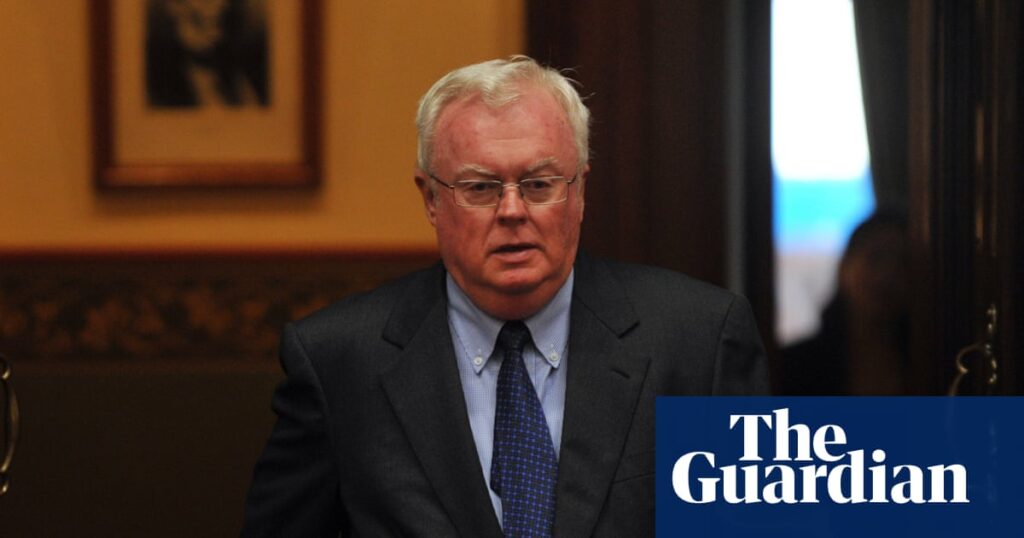Anthony Albanese has led tributes to the former Labor powerbroker Graham “Richo” Richardson, acknowledging him as a flawed but loyal and “larger-than-life character”.
Richardson, a senator for New South Wales between 1983 and 1994 and a minister in the Hawke and Keating governments, died early Saturday morning aged 76.
The former factional enforcer had battled worsening health problems for several years. He was first diagnosed with cancer more than a quarter-of-a-century ago.
Figures from across the political divide paid tribute on Saturday.
The prime minister said Richardson was “incredibly loyal” and “passionate about the cause of Labor”.
“He was a true believer. He’s someone who was very much loved within the Labor party but more broadly as well,” Albanese said.
Richardson was an “ultimate machine man but also someone that had a real policy impact in areas of the environment as environment minister”, he said.
Albanese said the “the Daintree stands protected as a result of the work that Graham Richardson did”, with the Queensland tropical rainforest and surrounding areas placed on the Unesco world heritage list in 1988 after Richardson advocated for it.
Sign up: AU Breaking News email
In an interview with ABC radio, Albanese said Richardson was capable of acknowledging his own flaws.
“He himself would say he wasn’t perfect, he was a larger-than-life character, and he was someone who always lifted up the spirits of a room where he was,” he said.
Albanese said Richardson was “fiercely loyal to those people around him, and in return, he inspired, I think, a great deal of affection”.
The treasurer, Jim Chalmers, said in a statement that there was a kind and generous side to a man widely regarded as a ruthless political operative.
“Richo’s legacy was to attach power to purpose, to harness his immense influence in the service of his country, its people and, in time, its environment,” he said.
“He was a peerless political animal, fearsome as a practitioner, but kind and generous in his semi-retirement.”
The NSW premier, Chris Minns, said Richardson would be remembered for “his political insight, his commitment to the party, and his deep understanding of Australian public life”.
“As environment minister, he helped secure protection and world heritage listing of the Daintree Rainforest and Kakadu National Park, landmark decisions that left a lasting legacy for Australia’s environment.”
The former NSW Labor premier and federal foreign affairs minister Bob Carr said Richardson left a “colossal” legacy as a federal environment minister.
“He was smart and funny and quick to get to the essence of anything. He did that on environmental causes and Australians for hundreds of years will enjoy the results,” Carr told the Courier Mail.
The former federal Liberal treasurer Josh Frydenberg posted online: “Vale Graham Richardson, whose brave battle with cancer has come to an end. A fiercely loyal Labor man who was not afraid to make friends across the political aisle.”
The broadcaster Phillip Adams said: “When it came to scandal few could hold a candle to Richo.”
Richardson became NSW Labor’s general secretary at just 27, at a time when intraparty machinations were marked by violence.
after newsletter promotion
Richardson was then the youngest-ever senator when he was elected – aged 33 – in the 1983 landslide that brought Bob Hawke to power. After the 1987 election, Richardson was promoted to minister for the environment, and later held posts in cabinet including the portfolios of sport and social security.
Richardson was seen as a key architect of the toppling of Hawke as prime minister, in favour of Paul Keating, in 1991.
Throughout his career, Richardson was regarded as a ruthless powerbroker in the right faction of the Labor party. He was unofficially known as “minister for kneecaps”, such was his reputation as party room enforcer.
The former health minister Neal Blewett described him as an “Antipodean Machivaelli” and “the arch proponent of vested interests”. The former foreign minister Gareth Evans said Richardson’s willingness to do “whatever it takes … was not always a recipe for good, principled government”.
Richardson revelled in the notoriety. His autobiography, published in 1994 when he resigned from the Senate, was entitled Whatever It Takes.
While Richardson was involved in numerous scandals throughout his career, he was never found guilty of any misdemeanour.
He appeared before two royal commissions: over party donations; and answering allegations by a prostitute (later recanted) about sex on a boat in Sydney harbour. The 1991 Marshall Islands Affair – in which it was alleged Richardson used his ministerial position to help a friend – ultimately forced his resignation from cabinet. He returned to cabinet in 1993, as minister for health, but resigned in 1994, citing ill health.
Richardson was linked to a prostitution ring in 1994, and made a settlement with the tax office in 2008 over an undisclosed Swiss bank account.
Richardson served as a board member on the Sydney Organising Committee for the Olympic Games, including a role as mayor of the athlete’s village during the 2000 Games.
He later made a reputation as an unapologetically firebrand media commentator.
The journalist Marian Wilkinson wrote a book on Richardson called The Fixer in 1996.
She wrote: “He was not a politician who believed in the rigid lines of black and white; he operated between those lines. He would say: if it wasn’t going to put him in jail, it wasn’t wrong. It was this attitude, too, that gave Richardson the winning edge. But it also brought his political career to the brink of disaster on more than one occasion.”
Richardson was made an Officer of the Order of Australia in 2020.
He was married twice, first to Cheryl Gardner, with whom he had two children. He had another son with his second wife, Amanda, whom he married in 2007.

